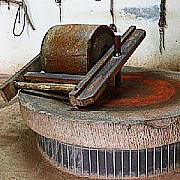D_Glenn wrote:
Besides the fact that without 'Qi' you would be dead.
There comes a point where everyone will no longer have the physical ability to train their 'gong'. They can only preserve their tendon strength.
And they have no real ability to cultivate 精 'Jing' and 氣 'Qi'. (They need to do that throughout their life alongside the 'gong' training.) They can only try to conserve it at this point.
But if they did train correctly (Quan + Gong + Qi) then the practices can focus on the 神 'shen' aspect of the martial art.
I've met quite a few of the bigger name people in the CIMA world, including you John, and I don't know if you are joking or not but only speaking of the feeling or maybe the constitution of everyone's body I do have to say that it did feel that you don't train with any regard to 'qi'. Your body seems like an old hardened tree, while everyone else has a ton of flesh surrounding the bones and they have a feeling of a young springy sapling. Chen Xiao Wang is at least 65 or older and he's as healthy as any 20 year old.
I think you have amazing knowledge of, and skills in Shuai Jiao but it makes me sad to think that you aren't a bit more concerned with your internal health.
Do you believe in acupuncture?
.
I think John's point wasn't that you continue training your Gong, ability, into old age but that the Gong training doesn't leave you. My 5'7" 77 year old grandpa can still open animal traps with his bare hands that I have to step on to press the spring down enough to open and I am pretty strong and much bigger. He doesn't train that, it just doesn't leave.






